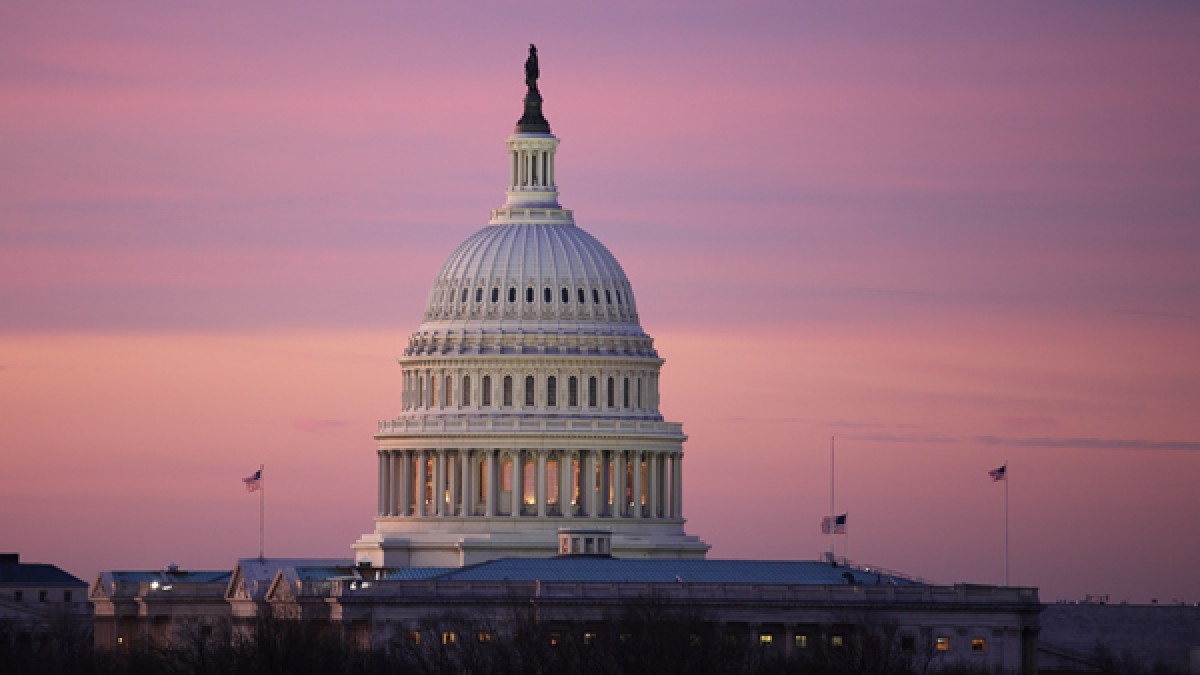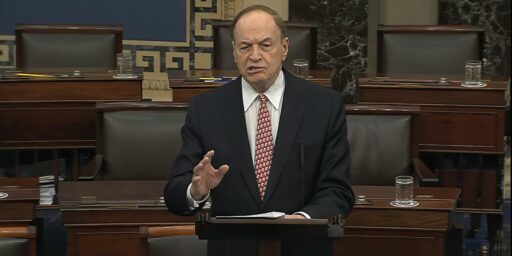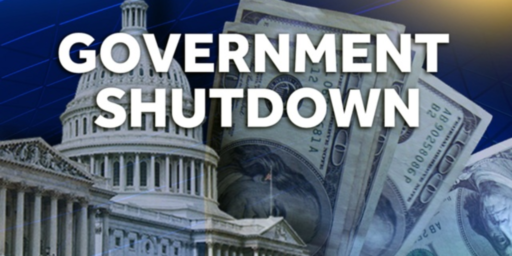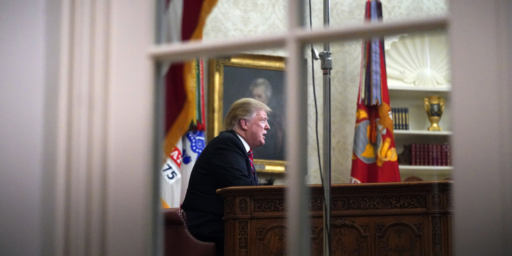Negotiators Reach Tentative Budget Deal, But Will The President Take It?
Congressional negotiators have reportedly reached a budget deal, but it's not clear if the President will agree to it.

Congressional negotiators have reached what they call a ‘tentative’ deal to avert a government shutdown at the end of the week, but it’s unclear where the White House stands on the agreement:
WASHINGTON — House and Senate negotiators on Monday night agreed in principle to provide $1.375 billion for fencing and other physical barriers at the Mexican border, part of a broader agreement that would stave off another partial government shutdown without funding President Trump’s wall.
The agreement would allow for 55 miles of new bollard fencing, with some restrictions on location based on community and environmental concerns, according to two congressional aides, who requested anonymity to disclose details of the private negotiations. That is a fraction of the more than 200 miles of steel-and-concrete wall that Mr. Trump demanded — and 10 miles less than negotiators agreed on last summer, before Democrats took control of the House.
The deal, which must still pass the House and the Senate, and secure Mr. Trump’s signature, came together just before Mr. Trump, framed by banners emblazoned with “Finish the Wall” at an event in El Paso, doubled down on his demands.
“We’re building the wall anyway,” he told the crowd, saying that aides had told him that the negotiators had made progress.
The funding for 55 miles of new fencing is a figure far lower than the $5.7 billion that Mr. Trump had demanded and marginally less than the $1.6 billion for 65 miles of pedestrian fencing in the bill that the Senate Appropriations Committee had passed last year.
In December, the president, concerned about reneging on his signature campaign promise, refused to sign onto that legislation, forcing the nation’s longest government shutdown.
The negotiators also agreed to reduce the number of migrants and undocumented immigrants who can be held in detention. Democrats’ demand for a limit on how much detention space could be used for unauthorized immigrants arrested within the United States had threatened to derail the negotiations over the weekend, but lawmakers agreed to waive the demand.
Instead, lawmakers agreed to adhere to levels, set by a number of detention beds, established in the previous budget. That would fund 40,520 beds, a decrease of about 17 percent from current levels, which Immigration and Customs Enforcement reached in recent months only by surpassing its funding caps.
Beyond the border barriers, the agreement, which primarily funds the Department of Homeland Security, would provide $1.7 billion more for border security, including technology at ports of entry, more officers and humanitarian aid.
The Republican and Democratic leaders of the House and Senate Appropriations Committees announced the agreement, which includes seven unfinished spending bills, after three private meetings on Monday. Disaster relief for areas affected by storms and natural disasters last year will not be included, and lawmakers said they would address it separately.
It is expected to be finalized as early as Tuesday, well before the Friday deadline when funding would again lapse for a number of federal agencies. With fears of another damaging shutdown, lawmakers seemed confident that they had the support of party leadership and that Mr. Trump would be willing to sign the agreement.
“We think so,” Senator Richard C. Shelby, Republican of Alabama and the chairman of the Senate Appropriations Committee, told reporters when asked about the likelihood of the president’s signature. “We hope so.”
“The specter of another government shutdown this close, I thought tonight we didn’t want that to happen,” he added later.
More from Politico:
Congressional negotiators announced an “agreement in principle” Monday night on a broad spending bill they hope will satisfy President Donald Trump’s demands for additional border barriers and avert another government shutdown at the end of this week.
The compromise represents a remarkable turnaround for negotiators tasked with staving off another shutdown, just hours after lawmakers on both sides said the talks were on the brink of falling apart.
“We reached an agreement in principle between us on all the homeland security and the other six bills,” said Senate Appropriations Committee Chairman Richard Shelby (R-Ala.), a lead Republican negotiator. “The White House has been consulted all along,” Shelby added, noting that he’s been given “latitude” to negotiate on behalf of the administration.
The tentative deal includes $1.375 billion for physical barriers — a type of fencing that resembles the “steel slats” that Trump has specifically called for, according to a congressional aide briefed on the talks. It includes a total of 55 miles, which is just 9 miles shy of Trump’s last budget request.
In exchange, Democrats agreed to drop their demand to restrict the number of people who can be detained by Immigration and Custom Enforcement at a time. Negotiators agreed to fund a total of 40,520 detention beds for ICE, a roughly 17 percent reduction from current levels, the aide said.
But one Republican source was quick to dispute Democrats’ account, saying the $1.375 billion in barrier funding can be used for “new miles of border wall.” The same Republican source suggested that the deal had enough flexibility to actually reach the president’s requested level of 52,000 beds, far above the negotiated level.
Details of the final deal may not be released until Wednesday, which has both parties aggressively attempting to spin the proposal as a win.
Shelby and House Appropriations Committee Chairman Nita Lowey (D-N.Y.) said they had approval from congressional leaders, namely Speaker Nancy Pelosi (D-Calif.) and Senate Majority Leader Mitch McConnell (R-Ky.). Shelby said he was also hopeful Trump would back the agreement but would not say directly if the president had promised to do so.
“The president told me, straight up, when I was with him… He told me more than once that if you can work out a legislative solution to this, do it. That’s what we’re trying to do,” said Shelby, who met with Trump last week. “Considering everything, this would be a good deal.”
The package would include all seven remaining funding bills, including agencies still reeling from a 35-day shutdown, like the IRS, the FDA and TSA. Lawmakers will not attach a massive disaster package, as Democrats initially sought.
Final text of the deal is unlikely until Tuesday, multiple lawmakers and aides said, with Lowey telling reporters she expected bill language on Wednesday.
It’s still unclear whether the House or Senate would move first. But both chambers must approve a deal by Friday to avert another partial shutdown, a challenge that’s made trickier by plans for former Rep. John Dingell’s funeral this week. Many lawmakers will travel to Michigan on Tuesday for the service.
The movement of bipartisan comity comes after negotiations over border security and avoiding a second government shutdown collapsed over the weekend, as Republicans rejected Democratic efforts to cap the number of detention beds that Immigration and Customs Enforcement can use for enforcement in interior regions of the U.S. At issue were detention resources for undocumented immigrants already in the United States, which Democrats wanted to impose new restrictions on to prioritize enforcement on violent criminals.
The deal comes as nearly everyone on Capitol Hill and in the Trump administration wanted to avoid a repeat of the record-setting shutdown last month, which lasted for 35 days. If Monday’s meetings had produced no progress, Congress and the White House would have had to turn to fallback options to avoid another shutdown, including a stopgap spending bill or unilateral action by Trump to fund his border wall.
This apparent last-minute agreement is a significant change from where things stood just twenty-four hours ago when it seemed as though talks had reached an impasse for reasons that seemed to be unrelated to the border wall or other spending issues. Specifically, the hang up centered around Democrats insisting that limits be placed on the number of beds authorized for the detention of migrants in areas near the border while Republicans pressed for exemptions from those limitations for migrants found to have criminal records. While the terms of the proposal have yet to be made public, it appears that this issue has either been resolved or that the issue has been deferred to future legislation. If that’s the case, then the Democrats appear to have dropped their demand to some extent which, for the reasons I explained yesterday, is probably a smart move by Democrats since it removes the risk that they’ll be tagged with blame if the agreement breaks down and we end up with a shutdown at the end of the week..
The important question, of course, is where the White House will stand on this agreement. As noted, there will be no funding for a border wall in the proposal but instead, it will provide roughly $1.6 billion for border fencing and repairs to existing border protections. This means that, in terms of the border security provisions, the proposed deal is essentially the same one that the Senate approved in December by unanimous consent, seemingly with Presidential approval, only to see the President turn around and say that he will not sign any deal that does not include funding for his border wall. This time, Senator Shelby said that the President told him the same thing he told Mitch McConnell, that he would sign off on whatever Congress was able to pass to avoid a shutdown. Whether that turns out to be the case or not, though, remains to be seen. At that point, the question will be whether the House and Senate might try to push the deal forward notwithstanding White House opposition and essentially dare the President to veto the bill and set off another government shutdown.
So, as always, stay tuned.
Update: Sean Hannity is already vetoing the deal.






Think about this. For the second time the President of the United States has not participated in the budget negotiations in any meaningful way but is still reserving the right to veto. He will wait to see what clownish television pundits think of it before deciding. In a country rocked by painfully obvious shocks delivered daily by the president, this development is probably going under the radar but is nonetheless misgovernance in an epic scale.
Waiting for Pearce to tell us how this is a major win for his Orange God.
If you are dumb enough to wear a red hat, that was made in China, which says something about America being great…then you are dumb enough to believe that
55 miles of border fencing = a big beautiful 35′ high concrete wall stretching from sea to shining sea
OT….
Individual-1 had his annual physical exam 4 days ago and no data has been released.
What are they hiding?
T
I don’t think either Shelby or McConnell are immune to trump’s lying so I certainly wouldn’t put any money on this getting a nod from trump. The House will vote on this no matter what (favorably of course) but I don’t see McConnell as having the balls to throw trump under the shutdown bus. Not yet anyway. So if trump says no, Mitch will cover for him.
@Daryl and his brother Darryl: https://www.usatoday.com/story/news/politics/2019/02/08/donald-trump-undergoes-annual-physical-exam-new-doctor/2810956002/
Next complaint?
@just nutha:
Yeah…all that “data” is from last year.
I put quotes around “data”…because it is obviously fictional…that fat orange fuqer weighs a lot more than 239.
@Daryl and his brother Darryl:
crickets……
Ann Coulter just ripped it as Trump’s Yellow New Deal, sayeth Twitter.
So…veto? Override? National Emergency?
@Teve:
Yes. But first, a tantrum.
We know that McConnell will not take up a vote to override a veto so, it’s either:
(1) Trump declares a ‘National Emergency’ which will get litigated and no wall built in the short run, or
(2) Ann Coulter orders a second shut down.